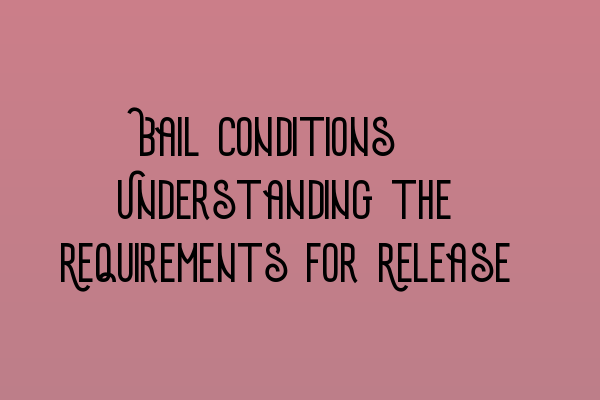Bail Conditions: Understanding the Requirements for Release
When facing criminal charges, one of the options that individuals may have is to apply for bail. Bail allows a person to be released from custody while awaiting trial, under certain conditions and guarantees provided by the defendant. Understanding the requirements for release on bail is crucial for anyone involved in the criminal justice system.
What are Bail Conditions?
Bail conditions are the set of rules and requirements imposed on a person who has been granted bail. These conditions are established by the court and must be followed in order to maintain bail status. Failure to comply with these conditions can result in the revocation of bail and the person being returned to custody.
Common bail conditions may include:
- Residence: The person may be required to reside at a specific address and may not change their residence without permission from the court.
- Reporting: The person may be required to report to a designated police station at specified times.
- Travel Restrictions: The person may be restricted from traveling outside a certain geographic area without permission.
- No Contact Orders: The person may be prohibited from contacting certain individuals involved in the case.
- Curfew: The person may be required to be at their residence during specific hours.
- Surrender of Passport: The person may be required to surrender their passport to the court.
Factors Considered in Setting Bail Conditions
The court considers various factors when establishing bail conditions. These may include:
- Nature and seriousness of the offense: The court takes into account the severity of the crime when determining the conditions.
- Criminal history: The person’s past criminal record, if any, can influence the conditions set by the court.
- Risk of flight: The court assesses the likelihood of the person fleeing or not appearing for their trial.
- Community safety: The judge weighs the potential danger the person may pose to the community if released.
- Ties to the community: The court may consider the person’s connections to the community, such as employment and family, when determining bail conditions.
Having a knowledgeable and experienced criminal solicitor to represent you can greatly influence the outcome of your bail application. At SQE Criminal Law & Practice Law UK, our team of expert solicitors can assist you in understanding the bail process and help present a compelling case for your release.
Next Steps: SQE Preparation and Exam Dates
If you are preparing for the SQE 1 or SQE 2 exams, we offer comprehensive preparation courses to help you succeed. Practice exams and mocks are essential tools for enhancing your understanding and performance. Check out our related articles for more information:
- SQE 1 Practice Exam Questions
- SQE 1 Practice Mocks FLK1 FLK2
- SQE 2 Preparation Courses
- SQE 1 Preparation Courses
- SRA SQE Exam Dates
Recognizing the importance of proper bail conditions and having the right legal support is crucial for anyone involved in a criminal case. Contact SQE Criminal Law & Practice Law UK today for expert advice and effective representation.
